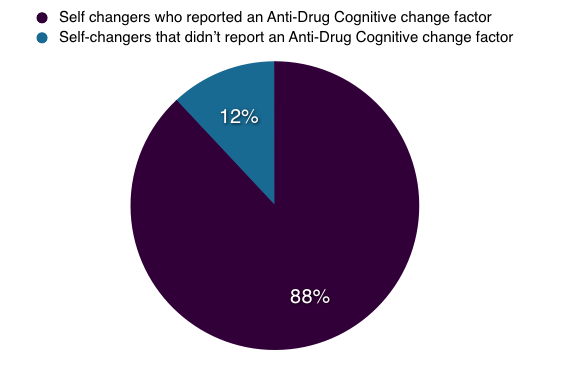There are more studies that point to cognitive evaluation as the major factor in self-change. A study of marijuana users who quit without treatment found similarly significant results. In this study 88% of the self-changers made cognitively focused statements of their reasons for quitting. And the author of the study states that “The strong role of the cognitive appraisal process suggests that using a decisional balance exercise to highlight the pros and cons of cannabis use may help to motivate cannabis users in treatment”. Meaning we should take what we’ve learned about why these self-changers quit and apply it to people who need help. That’s the same thing I’m saying, take what we learn from the most successful group and use it to guide those who want to end their substance abuse problems. The thing that we learn from self-changers is that they go through a process of cognitive evaluation or appraisal.
Since I love the power of visual aids let’s look at a chart that shows how many self-changers in this study reported a cognitive change factor.
There is plenty more research that points to cognitive processes as being integral to success in reducing substance abuse. One study had problem drinkers generate alternative ways of responding to situations in which they would normally end up drinking in a problematic way (relapse prevention). Those who came up with cognitive responses experienced significantly fewer post-treatment drinking days, and fewer drinks per drinking day than those who didn’t come up with cognitive responses. Cognitive responses were those that focused on mentally restructuring the situation, weighing the costs and benefits, or engaging in self-motivational thoughts. The other less successful categories of response were “Behavioral” in either an avoidant or coping way. These responses were characterized by seeking support from a friend, avoiding the situation, or escaping the situation. The main point to remember here is that in this study those who generated cognitive strategies for avoiding relapse did significantly better than those who focused on rote behavioral strategies.
From: What Works?, by Steven Slate, Untitled Addiction Workbook, Copyright 2005
Citation:
- Ellingstad, T.P.; Sobell, L.C.; Sobell, M.B.; Eickleberry, L.; Golden, C.J. Self-change: A pathway to cannabis use resolution. Addictive Behaviors 31 (2006) 519-530
